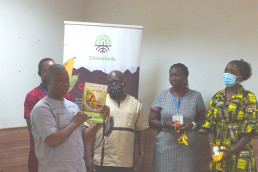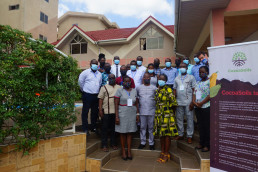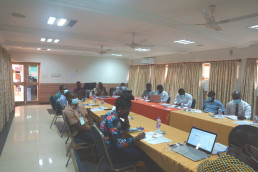The CocoaSoils program has unveiled a training manual on managing soils fertility for improved cocoa productivity and decreased deforestation to the program’s private and public sector partners at a Partnership for Delivery (P4D) committee meeting held in Kumasi, Ghana on October 14th 2021.
The training manual was unveiled by Dr Amos Quaye, Research Scientist at the Soil Science Division of the Cocoa Research Institute of Ghana (CRIG) and the Core Trial Manager of the CocoaSoils program in Ghana, assisted by Janet Owusu-Asabre, Project officer of the CocoaSoils Project, Glowen Kyei-Mensah of IDH and representatives of the program’s private partners.
Present at the unveiling ceremony were representatives of the program’s private sector partners: Kuapa Kokoo, Mondelez, Rockwinds, Barry Callebaut, Yara and Nestle. Officials of AgroEco, Cocoa Research Institute of Ghana (CRIG), Cocoa Health and Extension Division, COCOBOD, Forestry Commission and the Cocoa and Forests Initiative also witnessed the unveiling.
The manual was developed with input from the programme’s private sector and public sector partners by considering the key capacity needs of cocoa farmers in Cameroon, Côte d’Ivoire, Ghana and Nigeria.
The objective of the manual is to introduce the importance of nutrient supply through fertilizer application in cocoa farms and the need to implement good agriculture practices to maximize cocoa yield and income and decrease deforestation. It was designed to help field officers to pass on the latest knowledge in cocoa production to farmers in a language that ensures a good understanding of messages.
The manual provides up to date recommendations on the year-round management operations to increase cocoa productivity. The manual was developed to transmit up to date knowledge and know-how and the skills required to foster communication between field officers and cocoa farmers.
The Partnership for Delivery (P4D) committees in Cameroon, Côte d’Ivoire, Ghana and Nigeria reviewed the manual to ensure that the content is relevant and the language is not too scientific for the farmers.





That’s a great initiative from CocoaSoils. Would this manual be available online?
I concur with Anne-Sophie, how can we download the training manual?
Great initiative..
How xan we download the training manual.,?